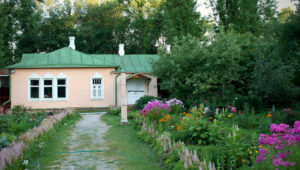
Anton Chekhov’s home and garden south of Moscow. Photo by John Griswold
I live with a blessed patch of pines between me and the main road, so I do not think about traffic much until the screaming sirens fly past, quite close, and I have to wait to see if there is a problem in my neighborhood—fire, medical emergency—as they take the long way around.
So why can’t I have a country estate, like some 19th-century writer, in order to get some peace and quiet and write my books (other than money and that I may be picturing something mostly gone)?
What I picture is Chekhov’s estate at Melikhovo, Russia, south of Moscow, where he worked hard and well—as both a doctor and a writer—was happy, and had his family and often friends with him. As the actress Olga Knipper, who would marry Chekhov, wrote later about their courtship:
I spent three wonderful days at Melikhovo…. Everything breathed comfort, a simple healthy life, you could feel the presence of a loving family. […] He was so joyful, so happy. He showed me his “domain”: a pond with carp, of which he was very proud—he was a passionate fisherman—the kitchen’s garden, the flowers. He loved gardening, he loved all earth’s gifts. I found everything there enchanting: the house, the little cottage where he wrote The Seagull, the garden, the pond, the flowering fruit trees, the calves, the ducks, and the village schoolmistress, running along the road with her pupils. They were three days full of wonderful intimations of the future, full of joy and sun. (Tr. Jean Benedetti)
O! why can’t I have a writer’s hut, as Bashō and others would call it? (Other than the money, again, and a child in school. And family in one location. And my already owning a house that is not a writer’s hut, in another state.)
Actually it’s hard to imagine what to imagine for myself, or even the contexts that would determine what to imagine. Landscapes and their use have changed. I would not need Chekhov’s train station, but an airport within three hours’ drive would be nice. He did not need a supermarket, but I do. He did not have piped water or electricity; I like a hot shower. We are alienated now from both our independence and our community.
I guess I picture for myself nothing more grand than a 1,500-square foot farmhouse; a small decrepit barn; 5-10 acres of rolling land with water and woods, a garden, and maybe something to produce a little income—fruit trees, hay field, wasabi bed. Edwin Way Teale and his wife had the right idea when they bought something similar (but with 15 times more land). Donald Hall and Jane Kenyon returned to an ancestral nest next to Ragged Mountain.
Writer Stan Crawford and his wife, Rose Mary, built their own house 20 miles north of Taos, and the property it sits on is a working farm, with a garlic-sorting shed, greenhouse, chicken coop, a tower guesthouse with a solar array, and a pond full of cattails that processes graywater. He admitted, when I spoke to him years ago, that land use and population density had changed; writers such as himself could no longer afford to buy there now.
It all starts with the land. Here is a video by a young couple who build rustic houses on their land; at 4:45, the man starts talking very sensibly about priorities when you wish you had land, and trying when wishing you could build something.
In fact my place would not have to be a farm at all; I think I mostly long for a combination of comfort, beauty, quiet—refuge—and a place to work. Years ago when I wrote for McSweeney’s I imagined the following on the way to a job interview:
“We drive through West Virginia. I use the mountains to help me visualize the North Woods, where the hiring college is. We’ll buy several acres and design a home to fit the site. It’ll have the hammerbeam frame of a 15th-century barn, with clerestory windows along the ridgeline to flood the upper floor with light. I’ll cross-country ski to work and have just one drink before dinner, and a lot of writing will get done, a lot of writing. It all sounds very Scott-Fitzgerald-at-Juan-les-Pins, but it’s really true.”
(Robinson Jeffers was as hardheaded as the granite boulders he used to make his house, and he got his writing done too.)
There is one other advantage to a place out by itself: at least you know if the siren banshees are coming for you.
